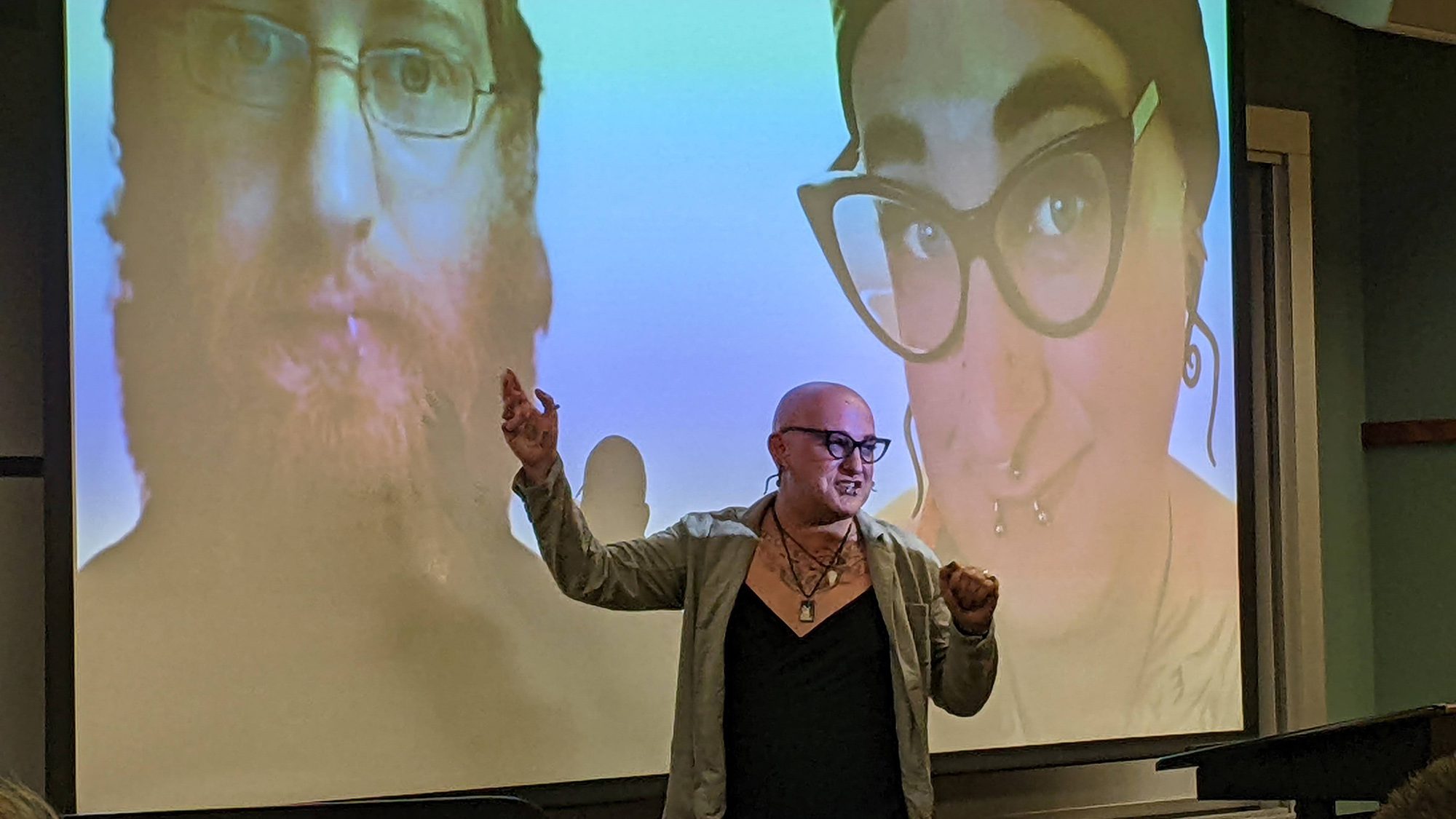Speaking the language of gender expression

Ley David Elliette Cray pointed at two faces projected on the screen behind her in McEachern Lecture Hall.
The face on the left wore glasses and a full beard – “a handsome devil” named Wes, said Cray.
“Eventually, this person turned into that person,” she said, pointing to other face on the screen, her own face – framed by dangling earrings, stylish eyeglasses and a scarf covering a bald scalp.
As an associate professor of philosophy at Texas Christian University in Fort Worth, Cray would eventually become the first openly transgender woman to earn tenure there – after navigating a few “devastatingly exhausting” years of code-switching in the conservative campus environment.
Cray’s personal story merged with scholarly insights and cultural reflections in the CLP presentation “Gender: Identity, Expression and Embodied Activism.” More than 100 students, faculty and staff attended the lecture, which was sponsored by Darren Hick, an assistant professor of philosophy at Furman.
Cray, a self-described “autistic, asexual, aromantic, non-binary transgender woman living in Las Cruces, New Mexico,” and a certified sexologist and LGBTQIA+ consultant, is the LGBTQIA+ curriculum coordinator for the Sexual Health Alliance.
She described gender as “the next step in our culture war.”
“It’s a wedge issue politically that is being further scrutinized and put in the public spotlight in order to get people to argue with each other,” said Cray, who uses the pronouns she and they. “Most of the agenda is coming from people who are really scared of this stuff and in some cases want to ban transgender people entirely. But what they say about it tends to be pretty uninformed; it has little to do with the actualities of it.”
Gender identity, Cray explained, “is a deeply felt existential sense of how one relates to themselves, other persons and the world around them in terms of gender.” Usually formed between ages 2 and 5, gender identity is comparable to left- or right-handedness, she said.
“We live in a right-handed world,” Cray said. “My right-handed friends don’t notice this. They just call it ‘the world.’”
She described gender identity as an internal “cognitive map of social actions, of things we might do in the world. And this map assigns values of compliance or transgression to these actions. But there’s a difference between having a map and not following it versus just having a different map.”
Cray defined gender expression as “the language-like system of norms … through which people within a culture externally communicate their gender identity to other persons.” Languages evolve over time, she said, and speakers don’t always conform to formal rules and standards.
“It’s a mark of fluency in a language that you don’t speak it perfectly,” she said. “You speak in metaphors, analogy and similes. You speak sarcastically. You speak in dialect. You might innovate in slang. You might even become a poet.”
Gender expression is no different, Cray said. “There are some who feel they have to speak it perfectly in accordance with the grammar, but the more comfortable you are, the more you can lean into the slang, the sarcasm, the poetry of it.”
Having studied transphobia philosophically while experiencing it viscerally – “I moved out of Texas because I was scared for my life,” she said – Cray understands that “we are threatening because we break the system of gender.”
Using the language of gender expression in a way that goes against cultural expectations – whether it’s Harry Styles wearing a dress or a transgender person simply existing – can push against transphobia by mere exposure, ultimately making those expressions non-threatening.
“The louder we are, the sooner the transphobes will get bored with it,” Cray said.